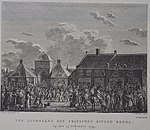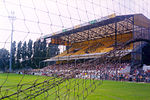Breda

Breda ( BRAY-də, also UK: BREE-də, US: bray-DAH, Dutch: [breːˈdaː] ) is a city and municipality in the southern part of the Netherlands, located in the province of North Brabant. The name derived from brede Aa ('wide Aa' or 'broad Aa') and refers to the confluence of the rivers Mark and Aa. Breda has 185,072 inhabitants on 13 September 2022 and is part of the Brabantse Stedenrij; it is the ninth largest city/municipality in the country, and the third largest in North Brabant after Eindhoven and Tilburg. It is equidistant between Rotterdam and Antwerp. As a fortified city, it was of strategic military and political significance. Although a direct fiefdom of the Holy Roman Emperor, the city obtained a municipal charter; the acquisition of Breda, through marriage, by the House of Nassau ensured that Breda would be at the centre of political and social life in the Low Countries. Breda had a population of 184,126 in 2021; the metropolitan area had a population of 324,812.
Excerpt from the Wikipedia article Breda (License: CC BY-SA 3.0, Authors, Images).Breda
Avenida Doutor José Pontes, Amadora Reboleira (Venteira)
Geographical coordinates (GPS) Address Nearby Places Show on map
Geographical coordinates (GPS)
| Latitude | Longitude |
|---|---|
| N 51.588888888889 ° | E 4.7758333333333 ° |
Address
Club Football Estrela da Amadora
Avenida Doutor José Pontes
2720-228 Amadora, Reboleira (Venteira)
Portugal
Open on Google Maps










